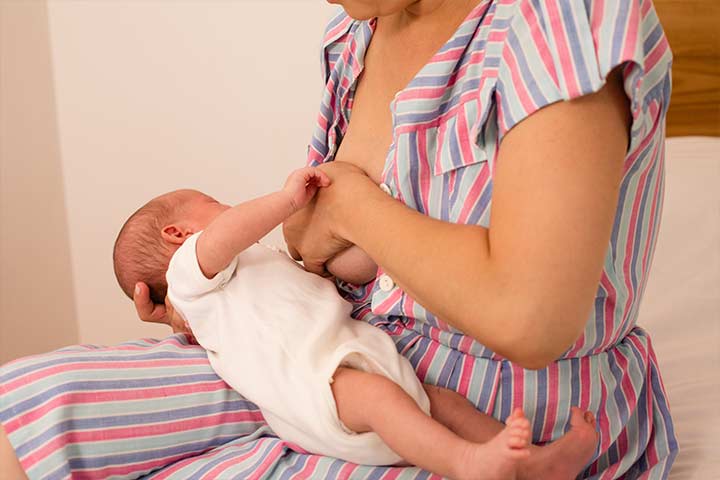
Image: Shutterstock
After the long journey of pregnancy and birthing, your baby will finally be in your arms! This is the time when you and your little one take the time to settle in and get to know each other. And although this time can be magical and deeply fulfilling, it’s also challenging as you and your baby will face many hurdles together. One such problem is that of breastfeeding. Breast milk is essential for your newborn as it is their primary source of nourishment for at least the first 6 months. Breastfeeding has several benefits on the baby and the mother. The baby grows and develops well and the mother is able to expel milk, alleviating the discomfort caused by engorged breasts.
Your baby will need to breastfeed multiple times a day and so, the mothers brain, hormones and milk ducts work tirelessly to provide enough milk. However, the breastfeeding process may not be as smooth sailing as you expect it to be. If you are just beginning your breastfeeding journey or about to deliver soon, you may experience breastfeeding problems like poor latching, cracked nipples and engorged breasts. But there is no need to panic. They can be treated and alleviated once you know why it is happening. Read on to know what can be done if you find breastfeeding painful.
Why Does Painful Breastfeeding Happen?
Image: Shutterstock
Breastfeeding is common in the early stages. But just because it’s common does not make it normal. This is a warning sign from your body to reassess what you are doing and make adjustments so that you and your baby are comfortable while your infant gets the nourishment they need. It’s perfectly okay to feel nipple sensitivity the first few days after delivering. You may also feel a slight tingly sensation due to hormonal changes resulting in your breasts feeling tender and sore. However, if you experience pain while nursing, you should let the health care staff know right away.
There may be many reasons why you experience pain while breastfeeding. Nipple size and shape can also play a role. If your nipples are flat or inverted, it may make it harder for your baby to latch on and get the hang of breastfeeding (1). Silicone shield nipples will help your baby learn how to latch on to the nipple faster. Similarly, breastfeeding is made more painful and uncomfortable if your baby is tongue-tied. It is a short lingual frenum that interferes with normal tongue movement. Although this may make feeding difficult for your baby now, it can also mean several problems arising in the future. This is why it is beneficial to you and your baby if they are diagnosed during breastfeeding as the early screening process will reduce the risk of speech impediments, sleep apnea, heart implications and dental implications (2). Working with a lactation consultant will also result in your tongue-tied baby successfully breastfeeding.
You could also experience pain due to fungal infections like thrush which usually develops due to excess sweat, moisture and warmth (3). Or due to clogged milk ducts that cause a tingling and often painful sensation which are all symptoms of an infection called mastitis (4).
Breastfeeding Pain Relief
Image: Shutterstock
So, what is the best remedy for painful breasts while breastfeeding? This differs according to the cause of your pain. Some women may remedy this through natural cures or by finding newer more comfortable positions to breastfeed in, whereas women who experience severe pain due to an infection will need to consult the doctor and take antibiotics in order to be cured and find relief.
Getting an infection is never pleasant, especially if it leads to chapped and bleeding niplles. Unfortunately infections like mastitis can come on suddenly and quickly. If you’re lucky and can ‘catch it early’ there are some home remedies which you can do to combat it. Some things that can help you get some relief are hot baths to calm your sore, aching breasts or a lukewarm shower while you massage your breasts to alleviate pain, engorgement and swollenness. It’s also important to continue to feed your baby even if your breasts are swollen. This may seem counterproductive but hand expression and manual or electric pumping in between feeds can often remedy breasts pain due to engorgement.
Other natural remedies to alleviate breastfeeding pain include warm compresses on the sore breasts and treating sore nipples with freshly expressed breastmilk. Cabbage leaf treatment, which involves applying chilled cabbage leaves to the breasts, has also been shown to reduce swelling and pain associated with breast engorgement. If all else fails, ask your doctor for an ointment or medication to deal with the pain and help the irritation and redness.
Breastfeeding your baby may not always be the magical experience you had hoped it would be, but it can be manageable. Remember, this pain won’t last forever. Soon you can go back to feeding your baby without flinching every couple of seconds. Happy parenting!














